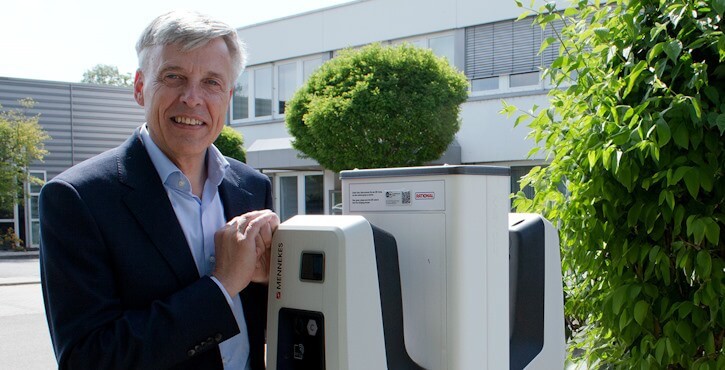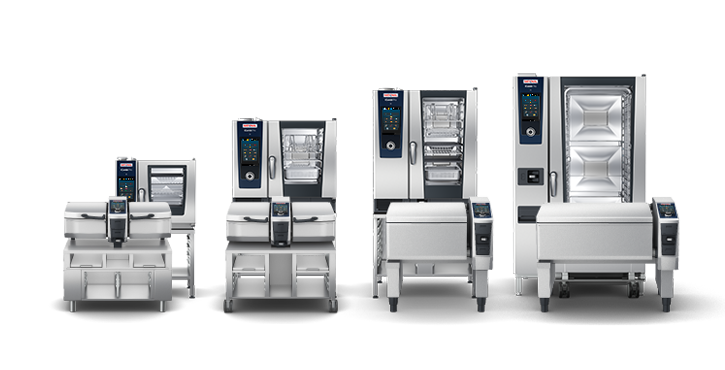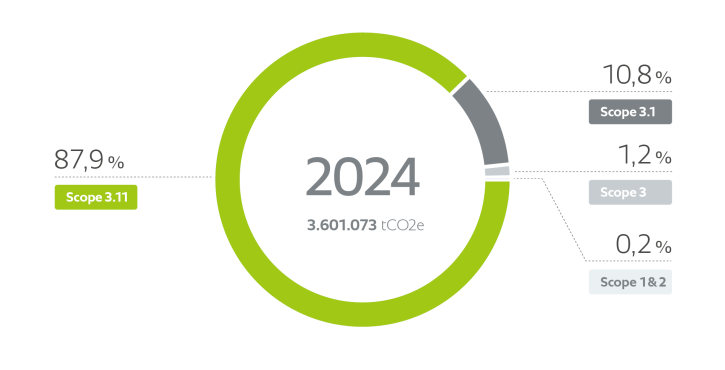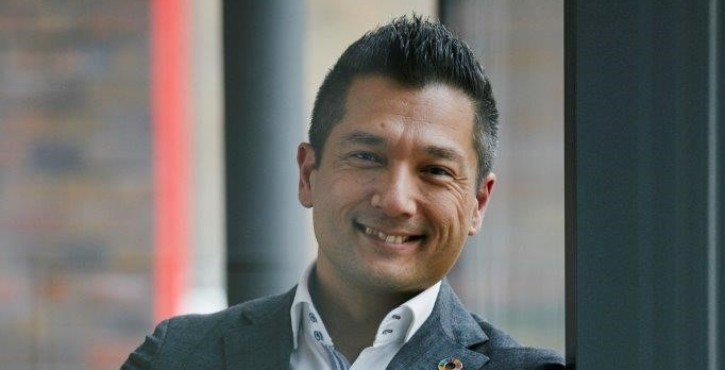We calculate our global Company Carbon Footprint based on Greenhouse Gas Protocol principles and methods. By setting ourselves the following targets, we aim for an absolute reduction in our greenhouse gas emissions (Scopes 1, 2, and 3) compared to base year 2023.
Scope 1 and 2
By 2030, we will have reduced our absolute greenhouse gas emissions (CO2e) by 42% compared to 2023. By 2050, we’ll reach 90%, and high-quality compensation projects will cover the remaining 10%.
Scope 3
By 2050, we will reduce our absolute greenhouse emissions (CO2e) by 90% compared to 2023 and cover up to 10% of residual emissions through high-quality CO2 storage compensation projects.
But that’s not enough for us, which is why we're currently working towards an intermediate goal of reducing our Scope 3 greenhouse gas emissions. To this end, we began structured development of a climate strategy in early 2024.
Interview:
Dr. Peter Stadelmann.

Dr. Peter Stadelmann, CEO of RATIONAL AG, explained in an interview why sustainability is on the Management Board agenda at RATIONAL, why every company has to take global responsibility, and why Environment, Social, and Governance are equally important topics.
Focus area: Environment.
Protect the climate.
We are reducing our greenhouse gas emissions and compensating those that are unavoidable. We are continually reducing our energy consumption as well as that of our cooking systems. We do this by relying on environmentally friendly technology and infrastructure (e.g., buildings, IT), making future-oriented progress, and using renewable energies.
Conserve resources.
We are minimizing or preventing resource consumption of all types in our company, our value chain, and our products. We conserve resources and use them within a circular economy.
Scope 1 and 2: RATIONAL’s own operations
Scope 3.11: Use of products sold
Scope 3.1: Purchased goods and services
Scope 3 (other): Additional emissions throughout our value chain
1. Cooking appliances heat food, which is why they consume a relatively large quantity of energy. This energy consumption makes our CCF Scope 3.11 very large. As the market leader, we at RATIONAL have always stood for high quality products with a long service life. We currently base our CCF calculations on a 12-year life cycle, meaning that we assume the cooking system's energy consumption for 12 years of service. This long service life thus increases our CCF Scope 3.11 even further.
Offering such a long service life benefits our customers from an economic perspective, but from an environmental standpoint, using older RATIONAL cooking systems isn't always ideal, since they consume more energy, water, and/or cleaning products. We are working on understanding these influences more thoroughly so that we can make corresponding recommendations to our customers.
By switching from conventional cooking appliances to our cooking systems and using them efficiently, our customers improve their CO2e balance. Using green electricity helps them lower their CCF even more.
2. The second largest category are emissions related to goods and services procured for RATIONAL cooking systems. Accordingly, close partnerships with our suppliers are important here.
3. Operational energy consumptions (such as heating and cooling, electricity and gas at our production sites and fuels for our global vehicle fleet) are assigned to Scopes 1 and 2. These make up a very small proportion of emissions, but we are still working constantly to reduce them even further.
Product Carbon Footprint.

We have also calculated the Product Carbon Footprint (PCF) for all of our appliances.* This metric helps us record emissions throughout the entire product life cycle, improving transparency regarding cooking systems' climate footprint.
We use two different methodologies:
- Cradle-to-Gate: from manufacturing to leaving the production facility
- Cradle-to-Grave: also encompasses transport to the customer, use, repairs, and disposal
This makes RATIONAL the first manufacturer in the industry to calculate PCF data using a combination of validated methods and extensive real-world cooking system usage data. Calculations are based on actual usage data from more than 100,000 networked devices – an approach unlike any other on the market thus far. The methodology is TÜV SÜD-validated and complies with international standards.
| Model | PCF* Cradle-to-Gate |
PCF* Cradle-to-Grave 1 (Global energy mix) |
PCF* Cradle-to-Grave 2 (100% renewable energy) |
|---|---|---|---|
| iCombi Pro 6-half size E | 3,082 lb CO₂e | 62,369 lb CO₂e | 11,032 lb CO₂e |
| iCombi Pro 20-half size E | 5,807 lb CO₂e | 140,862 lb CO₂e | 20,823 lb CO₂e |
| iVario Pro L | 5,397 lb CO₂e | 60,274 lb CO₂e | 13,894 lb CO₂e |
| Model | iCombi Pro 6-half size E |
| PCF* Cradle-to-Gate |
3,082 lb CO₂e |
| PCF* Cradle-to-Grave 1 (Global energy mix) |
62,369 lb CO₂e |
| PCF* Cradle-to-Grave 2 (100% renewable energy) |
11,032 lb CO₂e |
| Model | iCombi Pro 20-half size E |
| PCF* Cradle-to-Gate |
5,807 lb CO₂e |
| PCF* Cradle-to-Grave 1 (Global energy mix) |
140,862 lb CO₂e |
| PCF* Cradle-to-Grave 2 (100% renewable energy) |
20,823 lb CO₂e |
| Model | iVario Pro L |
| PCF* Cradle-to-Gate |
5,397 lb CO₂e |
| PCF* Cradle-to-Grave 1 (Global energy mix) |
60,274 lb CO₂e |
| PCF* Cradle-to-Grave 2 (100% renewable energy) |
13,894 lb CO₂e |
Click here (pdf, 0.22 MB) for more information on PCF.
* Global average values for a 12-year usage phase.
** Information on other models is available on request.
Any kitchen can conserve resources.

According to ENGIE Impact , energy-inefficient food preparation and storage account for nearly 80% of annual energy costs in the hospitality industry. To help restaurateurs cook more economically while also benefiting the environment, we keep energy efficiency in mind when developing our cooking systems.
Focus area: Social.
Foster equal opportunity.
We appreciate human diversity. And we want our company to reflect it. Diversity allows us to compound our strengths and mutually compensate our weaknesses. We do not tolerate discrimination in any form. We support lifelong learning and professional development. We also place great importance on this with our partners and customers.
Promote well-being.
1. It is our aspiration to offer our customers in commercial kitchens the best possible cooking tools. With over 900,000 cooking systems installed, we simplify and improve kitchen routines worldwide, enabling countless employees in commercial and industrial kitchens to work more effectively, safely, healthily, and smoothly.
2. We guarantee safe, healthy, and meaningful jobs in working environments marked by appreciation and fairness. We support employee well-being and individual life planning in alignment with company interests.
3. We promote healthy nutrition in society.
Focus area: Governance.
Create transparency.
We create transparency by adhering to regulations, and we communicate our guidelines openly with employees and business partners. We set ourselves ambitious, measurable goals, pursue them consistently, and show our progress.
Strengthen partnerships.
We work to protect human and labor rights throughout our entire value chain. Close collaboration with partners and in cooperative contexts helps us ensure rapid implementation of innovations.
Our sustainability KPIs.
These numbers are worth seeing.
Details and further information are available under the following link.


